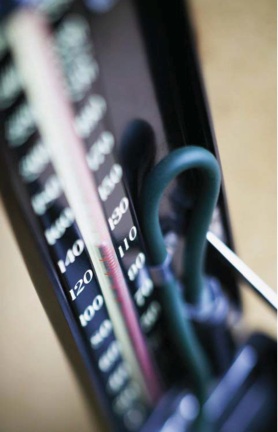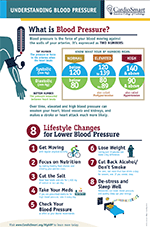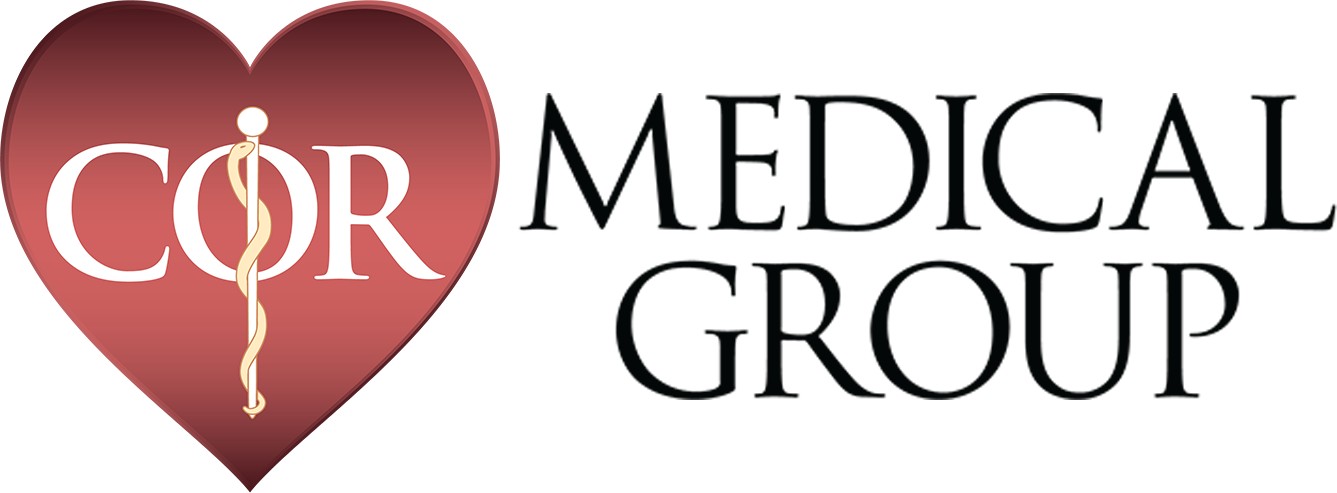Hypertension
Blood pressure is the pressure of the blood against the artery walls. The optimum blood pressure is below 120/80 mm Hg. High blood pressure, or hypertension, is a condition in which blood pressure levels exceed normal values. Blood pressure is indispensable for the blood to circulate throughout the body. If the blood does not circulate, the vital organs cannot receive the oxygen and nutrients they need to function. It is important to be informed about blood pressure and how to keep it at a healthy level.
When the heart beats, it pumps blood to the arteries and creates pressure on them. This pressure comes from two forces. The first force is created when the blood is pumped to the arteries by the circulatory system. The second is created when the arteries resist the flood of blood.
When you are healthy, the arteries are muscular and elastic. They stretch when the heart pumps blood through them. How much they stretch depends on how much force the blood exerts. Hypertension means there is an increase of pressure on artery walls, which contributes to heart disease, stroke and kidney failure.
Normally, the heart beats 60-80 times per minute. The blood pressure increases with each beat and decreases when the heart relaxes between one beat and the next. The blood pressure can change from one minute to the next, but normally, in an adult person, it should remain below 120/80 mm Hg (millimeters of mercury). Blood pressure that is always between 120-139/80-89 is considered pre-hypertension, and if it is always or mostly above 140/90 mm Hg, it is considered hypertension.
Click here for an infographic on What is Blood Pressure?
Systolic/Diastolic
- Systolic (the higher or top figure): represents the blood pressure when the heart beats.
- Diastolic (the lower or bottom number): represents that pressure when the heart rests between one beat and the next.
The systolic pressure is always stated first and the diastolic second. For example: in 120/80 (120 over 80), the systolic pressure is 120 and the diastolic is 80.
A blood pressure of 120-139/80-89 mm Hg is considered pre-hypertension. Blood pressure is considered high if it is 140/90 mm Hg or more.
High blood pressure increases the risk of heart attack, angina pectoris, stroke, heart failure, kidney failure and peripheral artery disease. High blood pressure also increases the risk of developing atherosclerosis. The risk of heart failure increases due to the greater effort that high blood pressure requires of the heart.
Click here for an illustrative presentation on high blood pressure.
Treatment of high blood pressure:
Lifestyle modification:
Natural methods to keep your blood pressure lower include aerobic (cardio) exercise and healthy eating with low salt intake and a diet rich in fruit, vegetables, whole grains and dairy such as yogurt.
Diet
High salt-content diets accelerate hypertension as we grow older. Consuming as little salt as possible can prove beneficial, especially for people sensitive to salt and the elderly. Even eliminating table salt and cooking salt can be beneficial. However, most salt is found in convenience foods (i.e. fast food, soups, salty snacks).
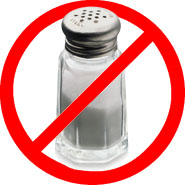
Losing weight immediately reduces blood pressure and helps reduce the size of the heart. Losing weight can allow patients with mild hypertension to reduce [blood pressure] and perhaps the ability to reduce or stop taking medication.
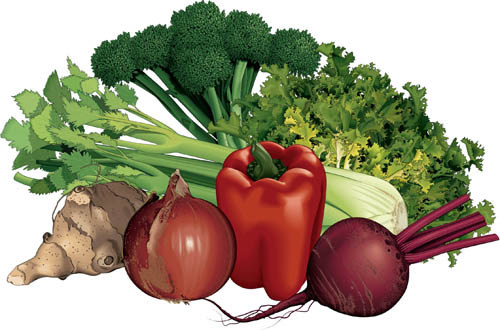
Smoking is a significant risk factor. Alcohol consumption can also increase the risk, unless it is consumed in moderation. The consumption of a few cups of coffee a day in healthy individuals is not very likely to cause damage. However, daily consumption of a large amount of caffeine can be deleterious. Hypertensive people should definitely avoid excessive caffeine.

Medications:
The medications designed to lower blood pressure can also be used to achieve your blood pressure objective. Your doctor may choose an antihypertensive medication that acts centrally on the heart to lower blood pressure. Otherwise, your doctor may choose an antihypertensive that acts peripherally dilating the arteries to reduce blood pressure. Talk to your doctor about these options. Most patients with hypertension will end up requiring more than one medication to get their blood pressure adequately controlled.
Click here for a printer friendly version of this article.
Click here to see an educational case study (vignette) authored by Dr. Urman and a colleague on “Not-So-Resistant Hypertension.”
For more information on high blood pressure, click here.
Written by and/or reviewed by Mark K. Urman, M.D. and Jeffrey F. Caren, M.D.
Updated 01/15/14
PLEASE NOTE: The information above is provided for general informational and educational purposes only and should not be used during any medical emergency. The information provided herein is not intended to be a substitute for medical advice, nor should it be used for the diagnosis or treatment of any medical condition. Accordingly, it should not be relied upon as a substitute for consultation with licensed and qualified health professionals who are familiar with your individual medical needs. Call 911 for all medical emergencies. Links to other sites are provided for information only – they do not constitute endorsements of those other sites. Please see Terms of Use for more information.


